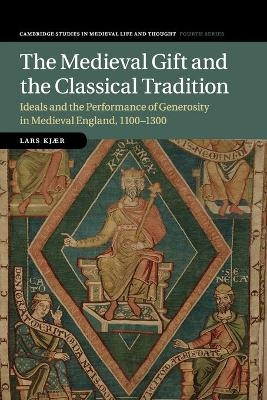
The Medieval Gift and the Classical Tradition
Ideals and the Performance of Generosity in Medieval England, 1100–1300
Seiten
2020
Cambridge University Press (Verlag)
978-1-108-43932-9 (ISBN)
Cambridge University Press (Verlag)
978-1-108-43932-9 (ISBN)
This interdisciplinary study explores how classical ideals of generosity influenced the writing and practice of gift giving in medieval Europe. Focusing on classical texts, such as those by Seneca the Younger and Cicero, Lars Kjær reveals how historians have underestimated the influence of classical literature and philosophy on medieval culture.
This interdisciplinary study explores how classical ideals of generosity influenced the writing and practice of gift giving in medieval Europe. In assuming that medieval gift giving was shaped by oral 'folk models', historians have traditionally followed in the footsteps of social anthropologists and sociologists such as Marcel Mauss and Pierre Bourdieu. This first in-depth investigation into the influence of the classical ideals of generosity and gift giving in medieval Europe reveals to the contrary how historians have underestimated the impact of classical literature and philosophy on medieval culture and ritual. Focusing on the idea of the gift expounded in the classical texts read most widely in the Middle Ages, including Seneca the Younger's De beneficiis and Cicero's De officiis, Lars Kjær investigates how these ideas were received, adapted and utilised by medieval writers across a range of genres, and how they influenced the practice of generosity.
This interdisciplinary study explores how classical ideals of generosity influenced the writing and practice of gift giving in medieval Europe. In assuming that medieval gift giving was shaped by oral 'folk models', historians have traditionally followed in the footsteps of social anthropologists and sociologists such as Marcel Mauss and Pierre Bourdieu. This first in-depth investigation into the influence of the classical ideals of generosity and gift giving in medieval Europe reveals to the contrary how historians have underestimated the impact of classical literature and philosophy on medieval culture and ritual. Focusing on the idea of the gift expounded in the classical texts read most widely in the Middle Ages, including Seneca the Younger's De beneficiis and Cicero's De officiis, Lars Kjær investigates how these ideas were received, adapted and utilised by medieval writers across a range of genres, and how they influenced the practice of generosity.
Lars Kjær is Senior Lecturer in Medieval History at the New College of the Humanities. His previous publications include, as co-editor, a special volume of the Journal of Medieval History entitled 'Feasts and Gifts of Food in Medieval Europe: Ritualised Constructions of Hierarchy, Identity and Community' (2011).
1. Introduction; 2. The gift in classical literature; 3. De Beneficiis in medieval contexts; 4. Writing generosity; 5. Sanctifying generosity; 6. Romancing generosity; 7. Performing generosity; Conclusion.
| Erscheinungsdatum | 13.08.2020 |
|---|---|
| Reihe/Serie | Cambridge Studies in Medieval Life and Thought: Fourth Series |
| Zusatzinfo | Worked examples or Exercises |
| Verlagsort | Cambridge |
| Sprache | englisch |
| Maße | 230 x 150 mm |
| Gewicht | 360 g |
| Themenwelt | Geisteswissenschaften ► Geschichte ► Regional- / Ländergeschichte |
| Geschichte ► Teilgebiete der Geschichte ► Kulturgeschichte | |
| Sozialwissenschaften ► Ethnologie ► Volkskunde | |
| Sozialwissenschaften ► Soziologie | |
| ISBN-10 | 1-108-43932-2 / 1108439322 |
| ISBN-13 | 978-1-108-43932-9 / 9781108439329 |
| Zustand | Neuware |
| Haben Sie eine Frage zum Produkt? |
Mehr entdecken
aus dem Bereich
aus dem Bereich
der stille Abschied vom bäuerlichen Leben in Deutschland
Buch | Hardcover (2023)
C.H.Beck (Verlag)
23,00 €
vom Mittelalter bis zur Gegenwart
Buch | Softcover (2024)
C.H.Beck (Verlag)
12,00 €
eine Geschichte der Welt in 99 Obsessionen
Buch | Hardcover (2023)
Klett-Cotta (Verlag)
22,00 €


